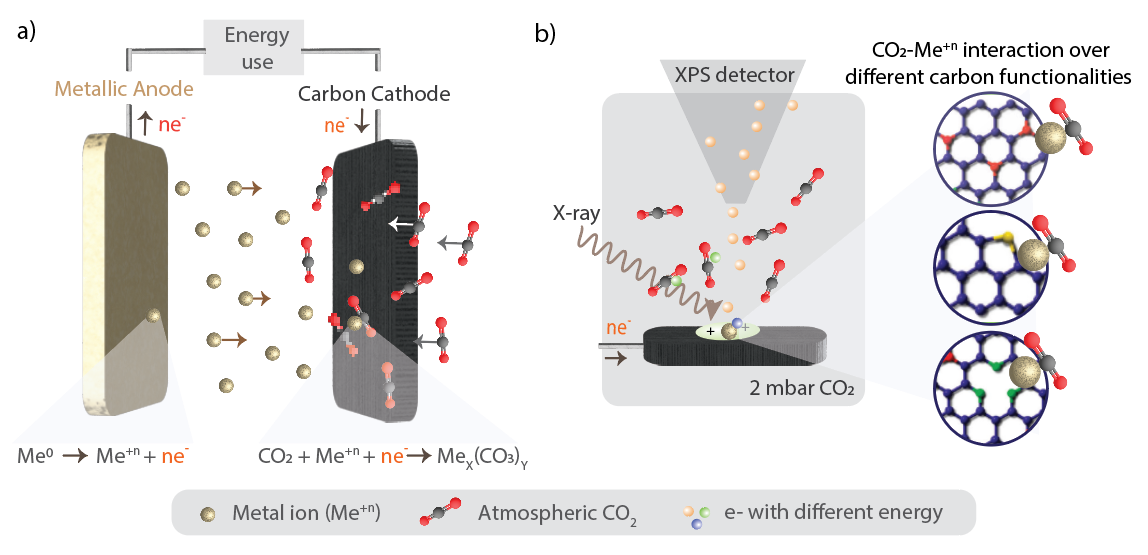Transition metal-CO2 batteries to bridge the gap toward a greener future (CO2BATT)

Against climate change: Recyclable batteries remove CO2 from the atmosphere
The urgent need to mitigate CO₂ emissions for a sustainable future cannot be overstated. By investing in carbon capture, utilization, and storage (CCUS) technologies, renewable energy, and energy efficiency measures, we can significantly decrease CO₂ emissions. Metal-CO₂ batteries (MCBs) offer a unique opportunity as they capture CO₂ and convert it into useful electrical energy, addressing both energy storage and emission mitigation.
However, MCBs are not without their challenges. The specific reaction requirements of CO₂ (low solubility, high overpotential) and the formation of by-products pose significant hurdles, making these batteries largely unexplored. The anode material (typically Li, Na, K, or Mg) is scarce or raises safety concerns or both. On the other hand, the cathode must efficiently facilitate the reduction of CO₂ selectively to the desired product, ensuring high capacity, good cycle stability, and effective charge and discharge processes.
Unlike current rechargeable Li-ion batteries, whose recyclability is vastly unexplored after years leading the market, the chemistry of such a new and promising battery should ideally be fully recyclable. That imposes (1) aqueous electrolytes, (2) carbonaceous materials that can be produced from renewable sources as cathodes, and (3) transition metals as anodes (i.e., Fe, Zn, or Al). However, such cathode materials, while amorphous, rely on foreign atoms (atoms other than carbon) to provide high activity and selectivity. To achieve that, it is key to gain knowledge of carbon sites that catalyze the transition metal ion conversion into a carbonate through CO2 reduction. This is especially missing for transition metal CO2 batteries (TMCBs), which are in their infancy, as most work was done focusing on Li chemistry
CO2BATT -Bold Ideas for Science
Media coverage
With its new Climate Protection Act, Germany has committed itself to greenhouse gas neutrality by 2045. To achieve this, emissions must be avoided, CO2 removed from the atmosphere, and fossil fuels replaced with renewable ones. According to experts, however, even after 2045 it will still be necessary to capture CO2 and then use it or store it in deep rock layers - known by the abbreviations CCS, CCU and CCUS ("Carbon Capture, Utilisation and Storage"). A new research project at the University of Paderborn is serving these efforts and is intended to develop so-called "transition metal CO2 batteries (TMBCs)". The batteries not only promise to store renewable energies, but also to reduce CO2 emissions . Jun. Prof. Dr. María Nieves López Salas and PD Dr. Teresa de los Arcos de Pedro, both from the Department of Chemistry , have now been awarded the university’s research prize.
Partner: PD Dr. Teresa de los Arcos de Pedro
PD Dr. Teresa de los Arcos de Pedro's webpage: https://chemie.uni-paderborn.de/arbeitskreise/technische-chemie/grundmeier/forschung/advanced-surface-and-interface-spectroscopy


